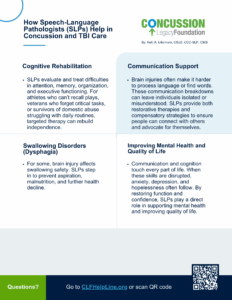The Critical Role of Speech-Language Pathologists in Concussion and TBI Care
By Kelli A. Uitenham, CScD, CCC-SLP, CBIS
When people hear “speech-language pathologist” (SLP), they often picture someone helping children learn to pronounce sounds or supporting individuals who stutter. While those roles are essential, the field of speech-language pathology reaches far beyond what most people realize, especially in the world of brain injury. SLPs are crucial in the prevention, evaluation, and rehabilitation of individuals with concussions and traumatic brain injuries (TBI). These conditions affect not only athletes but also military service members, police officers, domestic abuse survivors, and even individuals caught in the justice system.
Why Brain Health Needs SLPs
Concussions and TBIs disrupt the brain in ways that are not always visible but profoundly life-altering. While physical healing often receives the most attention, the invisible symptoms such as memory loss, poor focus, slowed information processing, word-finding difficulty, and impulsivity can dramatically impact work, relationships, and daily functioning.
This is where SLPs come in. Our work is not limited to “speech”, we specialize in restoring cognitive-communication skills, ensuring people can continue to participate fully in life, and in many cases, preventing tragic long-term consequences.
Core Areas Where SLPs Make a Difference
-
Cognitive Rehabilitation
- SLPs evaluate and treat difficulties in attention, memory, organization, and executive functioning. For athletes who can’t recall plays, veterans who forget critical tasks, or survivors of domestic abuse struggling with daily routines, targeted therapy can rebuild independence.
-
Communication Support
- Brain injuries often make it harder to process language or find words. These communication breakdowns can leave individuals isolated or misunderstood. SLPs provide both restorative therapies and compensatory strategies to ensure people can connect with others and advocate for themselves.
-
Swallowing Disorders (Dysphagia)
- For some, brain injury affects swallowing safety. SLPs step in to prevent aspiration, malnutrition, and further health decline.
-
Improving Mental Health and Quality of Life
- Communication and cognition touch every part of life. When these skills are disrupted, anxiety, depression, and hopelessness often follow. By restoring function and confidence, SLPs play a direct role in supporting mental health and improving quality of life.
Populations Beyond the Playing Field
- Athletes: From student athletes to professionals, SLPs help those recovering from concussions navigate school, sports, and life after injury.
- Military and Veterans: Blast exposure and combat injuries increase risk for TBI. SLPs provide cognitive and communication rehabilitation that is essential for reintegration into civilian life.
- Police Officers and First Responders: High-stress jobs combined with repeated physical trauma put them at risk for brain injuries that can impair performance and decision-making.
- Domestic Abuse Survivors: Survivors of intimate partner violence often suffer repeated head injuries that go unnoticed and untreated. SLPs offer therapy to restore lost skills and advocate for proper recognition of these hidden injuries.
- Justice-Involved Populations (The TBI-to-Prison Pipeline): Research shows a striking overrepresentation of people with untreated brain injuries in prisons. Many incarcerated individuals have histories of concussions, TBI, or repeated head trauma from sports, violence, or abuse. Without diagnosis and treatment, symptoms like poor impulse control, difficulty following rules, or problems with memory can lead to cycles of misunderstanding, punishment, and incarceration. This “TBI-to-prison pipeline” highlights the urgent need for SLP involvement—not only in rehabilitation but also in prevention, screening, and advocacy. By addressing communication and cognitive challenges early, SLPs can help break this pipeline and offer individuals a chance at stability rather than incarceration.
Breaking the Silence
One of the greatest challenges is lack of awareness. Many healthcare providers, families, and even patients themselves don’t know that SLPs are a vital part of concussion and TBI care. As a result, individuals leave hospitals or clinics without referrals, never realizing their cognitive and communication difficulties could be treated. By raising awareness and ensuring SLPs are part of the care team, we can prevent needless suffering and systemic consequences, including incarceration.
Moving Forward
The journey of recovery from concussion and TBI is complex, but it is not hopeless. SLPs bring expertise that bridges the gap between physical recovery and true quality of life. We help individuals reclaim independence, dignity, and connection, whether they are athletes, service members, survivors, or justice-involved individuals.
By shining a light on the critical role of SLPs and advocating for earlier intervention, we can dismantle harmful pipelines, restore lives, and give voice to those silenced by brain injury.
How You Can Help
Awareness is the first step, but action is what drives change. Here are a few ways you can make a difference:
- Advocate: Push for policies that ensure every individual with a suspected brain injury gets access to cognitive-communication screenings and referrals to SLPs.
- Support Research: Donate to organizations funding research on concussion and TBI, helping us learn more and build better interventions.
- Educate Your Community: Share information about the signs of concussion and the role of SLPs with athletes, families, coaches, teachers, and healthcare providers.
- Break the Pipeline: Support re-entry programs and rehabilitation initiatives for justice-involved individuals with brain injuries to help stop the cycle of incarceration.
- Seek Early Help: If you or a loved one experience symptoms after a concussion or head injury—memory issues, difficulty concentrating, or language changes—ask specifically for an SLP referral.
Together, we can ensure that no one falls throughbr the cracks of silence, misunderstanding, or neglect. Brain injury recovery is possible—and SLPs are here to make sure voices, minds, and futures are not lost.

You can download this helpful infographic here.